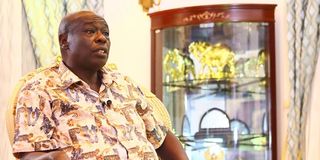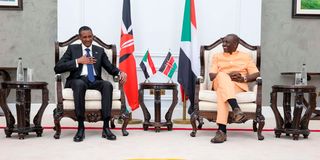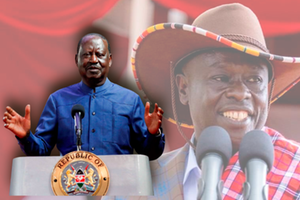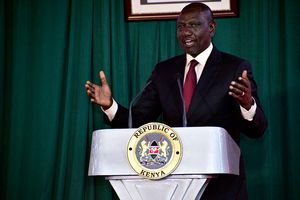
President William Ruto during the World Micro, Small Medium Enterprises Day celebrations at Kenyatta International Convention Centre, Nairobi, on June 27, 2025.
Glib-tongued and quick-witted, President William Ruto has for decades styled himself as something of a Houdini of Kenyan politics — going against the odds to escape exceptionally difficult circumstances to emerge even more potent.
But less than three dramatic years since he rode to an unlikely electoral victory on the back of lofty promises to lift the most downtrodden from the bottom of the pile, Dr Ruto once again finds himself in yet another uncomfortable political situation with the spaghetti bowl of unconventional Gen Z opponents and a more familiar, if vicious, opposition led by his estranged deputy Rigathi Gachagua.
Critics often point out that the President’s perceived strengths— mirrored by the conduct of his key allies —are also the chink in his armour. Focus is now firmly on how the President will handle the Gen Z discontent, which has largely been expressed through demonstrations and online. The latest, on Wednesday June 25 whose failed target was to occupy Stated House but caused disruption in at least 25 counties, has triggered a crisis with threats of more protests in July. Will he take a hardline stance or soften his approach?
Some, however, believe the recent protests are a sign of a bigger problem.
“Ruto’s Cabinet and surrogates have not helped either. The ineptitude of some cabinet members, their extravagance, and lack of understanding of their roles makes the president’s job that much harder,” says Prof David Monda, a US-based university lecturer and a political analyst.
He argues: “Ruto’s obsession to micro management in the different ministries undermines the independence of CS’s and makes a mockery of delegation. Ruto’s surrogates don’t help either with their reckless statements flaming ethnic bigotry, reinforcing police brutality and showing a total disconnect from the problems of a majority of struggling Kenyans.”
Some say that the architect of ‘Hustlers versus Dynasties’ created a monster that has returned to devour him.
Embracing ‘hustlers’
His critics perceive that, by embracing the ‘hustlers’ and pitting them against the ‘dynasties’ in his 2022 campaign, the president awakened a consciousness in that social group, and that fire has never died down. Now, they feel that he and his key allies have joined the “dynasties” at the dining table, excluding them.
His bottom-up model that hinges on “wealth distribution” where in theory the rich are supposed to be taxed more to support the poor — the Housing Levy and the Social Health Insurance Fund in particular— has also met strong opposition from the so-called middle-class and salaried workers, many of who feel unfairly targeted. At the same time, the people at the bottom, who are the supposed beneficiaries of this architecture are largely also complaining of experiencing little or no change.
The President’s conduct and style have also consistently remained under scrutiny. From his penchant for giving strings of promises that are mostly fulfilled in breach and the impressive ability to recite statistics and names, and the conspicuous display of opulence, the President is seen to be facing a trust deficit that affects public perception.
Not that the President thinks there is anything wrong with his administration beyond the “noises” made by critics. On Friday at the Kenyatta International Convention Centre and during the recent Cabinet retreat, like he does in all public meetings, he told off critics, took an inordinately long time to enumerate his achievements and promise better times ahead.
Government Spokesperson Isaac Mwaura describes the criticism against the President as normal, but notes that he has to make tough decisions to move the country forward. He says some of the criticisms are not genuine but are designed to derail the Kenya Kwanza administration.
“Any leader while in power always faces criticism without exception. Political opinion and alliances may change, but when in power, one must make tough decisions that aren’t as popular in order to move the country forward. That’s when people’s opinions shift based on their shifting interests as well. People always resist change,” says Mr Mwaura.
On claims that the President is a micro-manager and a one-man show, he describes his style of leadership as hands-on.
“He gets things done. He is a very high performer and with high energy. A great time keeper, he suffers no mediocrity. He is the best President to have at this point in time,” he says.
Inflation
Mr Mwaura says that having taken over from Mr Uhuru Kenyatta when the economy was in a shambles, the President has been able to turn around things by increasing productivity in agriculture and farmer earnings, the shilling is now stable, inflation is at an all-time low among other achievements.
“The President has fulfilled most of the promises going by the Bottom-Up Economic Transformation Agenda plan manifesto,” he adds.
Impeached Deputy President Rigathi Gachagua, now the president’s sworn adversary, says the Head of State is his own enemy.
“I left Mithika Linturi (former Agriculture Cabinet Secretary), Justin Muturi (former Attorney General), and the others who were called incompetent—nothing has changed. What’s the common denominator here? William Ruto, so who’s incompetent? He has changed the Cabinet four times but nothing has changed. What’s the common denominator here? William Ruto. So who’s incompetent? He is the common denominator of failure. He has changed Cabinet four times, nothing has changed,” he told NTV in an interview on Friday.

DCP Party leader Rigathi Gachagua during an exclusive interview with NTV at his Karen home on June 27, 2025.
To be fair, the Kenya Kwanza administration inherited some of the problems from Jubilee’s Uhuru Kenyatta Presidency – where Dr Ruto was deputy for 10 years – but a confident Dr Ruto in his inauguration speech and soon thereafter said he had The Plan.
Prof Macharia Munene notes that some of the policy decisions made by the Kenya Kwanza administration may be well-intentioned but turn out to be disastrous due to a lack of sound advice and proper implementation plan.
Prof Munene accuses the President of failing to listen to his advisers before making public pronouncements. The professor cites the confusion in the health and education sectors as examples.
The President has, in a desperate attempt to push through his agenda, often ignored questions and concerns about key policies and projects that he is determined to push through. Some have struggled to take off or have been torpedoed by the courts.
“He seems to have a problem listening to his advisers. He wants to rule like Daniel Moi but in a different set up with a well-educated population. The children Mwai Kibaki took to school have learnt how to think and ask questions,” Prof Munene says.
He adds: “The Ruto teams behave like aristocrats. They flash a lot of money. In the process, two societies are emerging in the country, leading to the kind of the current pushback.”
Within the last year, bringing in Raila Odinga’s allies and signing of a Memorandum of Understanding between the ruling United Democratic Alliance (UDA) and Orange Democratic Movement (ODM) in the so-called broad-based government initially brought some level of stability but the Ruto administration appears to be back to crisis mode.
Uriri MP Mark Nyamita, a member of ODM party, says the current resistance is being waged by individuals who have in the past unfairly benefited from the national cake at the expense of the others.
“Ruto created a lot of hope when he ascended to power. He has achieved a lot within the three years, but the premium on him is all-time high. Some of his transformative agenda like the universal health coverage has been under systematic resistance by a few individuals, who used to benefit from the old system,” says Mr Nyamita.
Lofty promises
But others say the President made lofty promises that he has since realised he cannot fully deliver. His style of politics which has worked for him for decades is increasingly being questioned and caricatured. Dr Ruto, the eloquent speaker with elephantine memory has always been the darling of crowds with his turn of phrase and expressive language. Now the dwindling trust in him as an individual and his administration is turning this political strength into a liability as people scrutinise everything he says.
Even when the projects he talks about are life-changing, like the 749-kilometre Isiolo–Mandera highway, which became a meme based on how the President had memorised the names of the towns, there is still lingering scepticism. Some critics have, in fact, accused Dr Ruto of remaining in perpetual campaign mode as he eloquently explains his administration’s achievements as he travels across the country.
Machakos Deputy Governor Francis Mwangangi says there are many unfulfilled promises two years to the next General Election. He says the President seems to be doing the direct opposite of what he promised in the run up to the last poll. Mr Mwangangi believes only a small group of people around the president have benefited from the administration despite the promise to uplift the living standard of the majority poor.
“People are over taxed and there is no commensurate service delivery. The same people he promised to give a better life are worse than they were before 2022, but people around him have become instant millionaires. They are splashing millions of shillings in harambees and the so-called economic empowerment programme,” he says.
The President has also on some occasions issued contradictory statements or eaten his words without fear of constipation. Abductions have a been a sticking point where he has oscillated between denying government involvement to promising there will be no more such disappearances then going quiet when they continue.
Former Attorney General Justin Muturi describes President Ruto as ‘conceited and dictatorial’. “Ruto is his own worst enemy because Ruto advises himself. He is very contemptuous of people around him regardless of who they are and their professions,” says Mr Muturi, who was fired from the Cabinet after taking on the President head-on over alleged abductions of his son by security agencies.
Arrogance and entitlement
Further, those who have worked with him talk of an obsession with control that has denied his core team the freedom to make their own decisions and become a weakness
There is also the perceived arrogance and entitlement by the President and his allies, who have been accused of being tone-deaf in responding to concerns and criticism. Some of it was seen in the response to the planned June 25 protests and last year when questions were raised about the Finance Bill.
The opulence and conspicuous displays of wealth, sometimes through harambees — which Dr Ruto had promised to ban before changing his mind— and personal possessions have in recent years been the subject of debate. This is also linked to impunity and corruption that some believe his administration is abetting.
“Ruto has earned notoriety in over promising and under delivering. He surrounded himself with political minions and clueless advisers who are either afraid of, unwilling or simply incapable of advising him. He is a Mr Know-Everything who cannot admit defeat or failure,” says Kitui Senator Enoch Wambua.
At the same time, there are those of the view that the president is always seeking validation, including from the West.

President William Ruto (right) and RSF Leader General Mohamed Hamdan Dagalo at State House, Nairobi.
“On foreign policy, he started out too eager to please Washington under the Joe Biden administration. Since then, Ruto’s foreign policy has been amorphous, contradictory, opportunistic and transactional. It has no ideological or strategic basis. Foreign policy issues appear poorly thought out and unimaginatively implemented. For instance, the Kenyan police are stuck in Haiti, with rising costs that the US refuses to pay and no end date for the return of the police from Haiti,” Prof Monda says.
In Sudan, for example, the Kenya Kwanza administration has sided with General Mohamed Hamdan Dagalo aka Hemedti, who is locked in fierce power struggle against General Fattal al Burhan - while pledging to be a neutral arbiter in the crisis.
For now, the immediate concern for the Ruto administration is the threat posed by the renewed Gen Z protests after a one-year lull. How he handles the crisis could make or break him.







